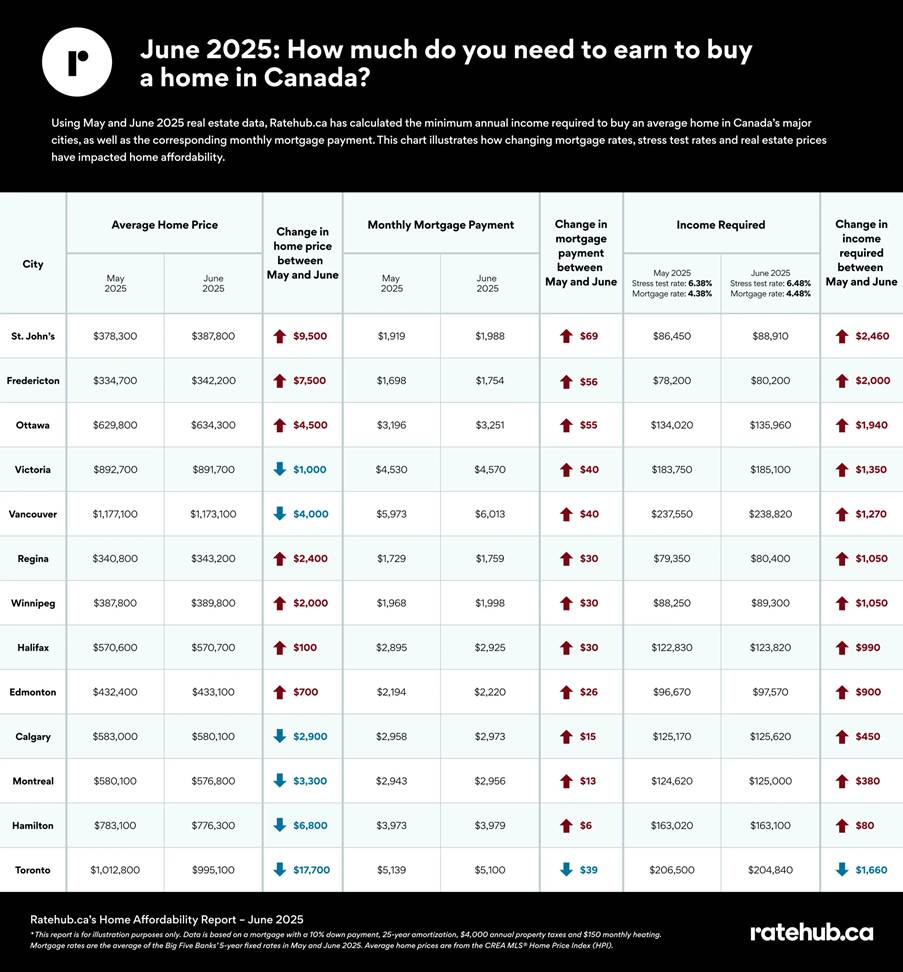One city defies the trend as housing becomes harder to afford nationwide

Housing affordability across Canada saw a significant decline in June 2025, with 12 of 13 major markets reporting an increase in the income required to purchase a home. This downturn is primarily attributed to a combination of higher mortgage rates and a continued rise in home prices, according to Ratehub.ca’s latest Affordability Report.
Rising rates and income requirements
The average mortgage stress test rate, a critical factor in loan qualification, climbed to 6.48% in June, a 0.1% increase from May. This upward trend in rates has directly impacted the financial hurdles prospective homebuyers face. Jamie David, senior director of marketing and mortgages at Ratehub.ca, noted the ongoing difficulty in homeownership, a challenge exacerbated by the Bank of Canada’s past rate cuts and subsequent hikes aimed at curbing inflation.
St. John’s, N.L., experienced the most substantial shift in affordability, with average home prices increasing by $9,500 and the required qualifying income jumping by $2,460 to $88,910. Other cities, including Fredericton, N.B., and Ottawa, Ont., also saw notable increases in required income.
All eyes on the Bank of Canada
The report highlights the intricate dance between inflation, interest rates, and housing demand. After a period of “rock-bottom rates” in 2020 that fuelled a housing boom and soaring prices, the Bank of Canada implemented a series of 10 rate hikes from March 2022 to July 2023 to combat runaway inflation, which peaked at 8.1%.
While these measures initially showed progress, the recent headline inflation reading of 1.9% in June 2025 suggests persistent inflationary pressures. The Bank of Canada has opted to hold its overnight rate at 2.75% for a second consecutive time, indicating a cautious approach as it monitors economic indicators.
The central bank is scheduled to make its next announcement on rates next Wednesday (July 30), but analysts see virtually no chance of a cut. Meanwhile, economists view an increasing possibility that the Bank will keep its benchmark rate unchanged for the rest of the year amid inflation concerns and a stronger-than-expected labour market.
That could mean no relief ahead on borrowing costs for Canadian homebuyers, with fixed mortgage rates also on the up in recent weeks thanks to an escalation in US president Donald Trump's trade war.
Toronto’s unique trajectory
Amidst the widespread decline in affordability, Toronto emerged as the sole major market to experience a modest improvement. This anomaly is attributed to a significant $17,700 drop in average home prices, which consequently reduced the income needed to qualify for a mortgage by $1,160. This localized trend offers a glimmer of relief in an otherwise challenging national landscape.

What are your thoughts on Canada’s housing affordability? Share your insights in the comments below.



